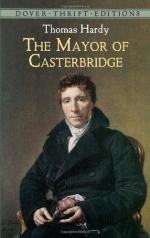Whether this were a dim possibility or the reverse, the courtship—which it evidently now was—had an absorbing interest for him.
Elizabeth, as has been said, often took her walks on the Budmouth Road, and Farfrae as often made it convenient to create an accidental meeting with her there. Two miles out, a quarter of a mile from the highway, was the prehistoric fort called Mai Dun, of huge dimensions and many ramparts, within or upon whose enclosures a human being as seen from the road, was but an insignificant speck. Hitherward Henchard often resorted, glass in hand, and scanned the hedgeless Via—for it was the original track laid out by the legions of the Empire—to a distance of two or three miles, his object being to read the progress of affairs between Farfrae and his charmer.
One day Henchard was at this spot when a masculine figure came along the road from Budmouth, and lingered. Applying his telescope to his eye Henchard expected that Farfrae’s features would be disclosed as usual. But the lenses revealed that today the man was not Elizabeth-Jane’s lover.
It was one clothed as a merchant captain, and as he turned in the scrutiny of the road he revealed his face. Henchard lived a lifetime the moment he saw it. The face was Newson’s.
Henchard dropped the glass, and for some seconds made no other movement. Newson waited, and Henchard waited—if that could be called a waiting which was a transfixture. But Elizabeth-Jane did not come. Something or other had caused her to neglect her customary walk that day. Perhaps Farfrae and she had chosen another road for variety’s sake. But what did that amount to? She might be here to-morrow, and in any case Newson, if bent on a private meeting and a revelation of the truth to her, would soon make his opportunity.
Then he would tell her not only of his paternity, but of the ruse by which he had been once sent away. Elizabeth’s strict nature would cause her for the first time to despise her stepfather, would root out his image as that of an arch-deceiver, and Newson would reign in her heart in his stead.
But Newson did not see anything of her that morning. Having stood still awhile he at last retraced his steps, and Henchard felt like a condemned man who has a few hours’ respite. When he reached his own house he found her there.
“O father!” she said innocently. “I have had a letter—a strange one—not signed. Somebody has asked me to meet him, either on the Budmouth Road at noon today, or in the evening at Mr. Farfrae’s. He says he came to see me some time ago, but a trick was played him, so that he did not see me. I don’t understand it; but between you and me I think Donald is at the bottom of the mystery, and that it is a relation of his who wants to pass an opinion on his choice. But I did not like to go till I had seen you. Shall I go?”
Henchard replied heavily, “Yes; go.”
The question of his remaining in Casterbridge was for ever disposed of by this closing in of Newson on the scene. Henchard was not the man to stand the certainty of condemnation on a matter so near his heart. And being an old hand at bearing anguish in silence, and haughty withal, he resolved to make as light as he could of his intentions, while immediately taking his measures.




